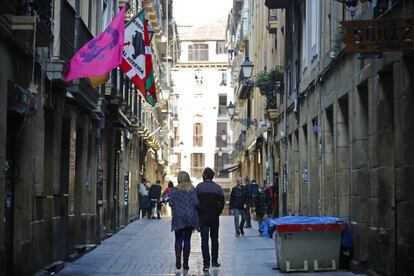ETA’s lost war
After 20 years behind bars, ex-convicts return to a different and more diverse reality in Basque Country
Not far from a threadbare flag demanding the transfer of ETA prisoners to Basque penitentiaries, a street in the town of Tolosa reflects the region’s new reality. One doorway is the entrance to the mosque of the Islamic Association Litaarafu and an Extremadura cultural center; another is the evangelical center Casa de Dios – run by a young pastor with the air of a rapper – and yet another is a Chinese bazaar called Haozailai. Only at the end of the street can you find traditional Basque-run businesses – a hairdresser and a grocery selling the gourmet beans Alubias de Tolosa.

ETA recently announced that it will fully disarm by April 8, marking the latest chapter in a history of terrorist activity that began in the late 1960s. Many of the group’s prisoners who are being released after sentences spanning an average of 20 years are coming back to a world that looks nothing like it used to; a world in which furniture is bought at IKEA and clothes in Zara and where there seems to be no room for their old demands.
Six years ago there were around 600 ETA members behind bars. Now, there are fewer than 280. Some of them, like Fernando Etxegarai, Josu Amantes and Oihana Garmendia, feel neither “defeated nor frustrated,” but others, according to Maritxu Jiménez, a psychologist who has been treating former ETA prisoners for 17 years, feel as though they have not only lost a war but are returning to a world where suddenly that war has no meaning.
There is now a plurality that would have been impossible in the ultra-nationalist vision of Basque society that ETA attempted to impose through weapons
In 2003, Arnaldo Otegi, then the leader of ETA’s political wing Batasuna, was filmed for the documentary The Basque Ball: Skin Against Stone outside the pelota court in Zubieta, a town on the outskirts of San Sebastián. “I have a Cuban friend who calls us the last natives of Europe,” he said on camera. “The day everyone in Lekeitio or Zubieta eats hamburgers, listens to American rock music, wears American clothes, replaces their language with English, and looks at the Internet instead of at the hills, that will be such a boring, boring day, that it won’t be worth living.”
Just 14 years later, a 20-kilometer drive from Zubieta to the town of Tolosa illustrates how this “boring” world has come to pass. The end of ETA violence has produced a snapshot of picture-perfect tolerance – the mosque, the Chinese shop and the evangelical cult center. It is the kind of plurality that would have been impossible in the ultra-nationalist vision of Basque society that ETA attempted to impose through weapons. In 1995, 45.3% of Basques cited terrorism and violence as one of their main concerns. In 2016, the figure had dropped to 0.7%. And now that a date for disarmament has been announced, how many Basques will remember terrorism at all in the next survey by the Center for Sociology Studies (CIS)?

“When a fierce civil conflict ends, there are two groups that are adversely affected by the vertiginous speed at which society moves on,” says Imanol Zubero, who teaches sociology at the University of the Basque Country (UPV). “There are the victims of terror attacks, who don’t understand how so many years of suffering can fall into oblivion; and then there are those who think of themselves as heroes because they have killed and spent years in jail in the pursuit of their dream of Euskal Herria [a Greater Basque Country encompassing parts of southern France]. Both groups are aware that society has forgotten them.”
Zubero, who used to require a bodyguard to protect himself against ETA attacks, but who still visited jails to administer examinations to ETA prisoners studying for degrees with the UPV, has noticed a gradual disintegration of “that feeling of shared suffering that used to exist within the abertzale [radical] left on the subject of ETA prisoners, and which used to be very strong.”
Line of fire
Historically, ETA looked after its jailed members as long as they toed the line, and reacted badly to any who broke ranks and negotiated their sentences or conditions on an individual basis, even going as far as assassinating them, as was the case with María Dolores Gonzalez Katarain, a senior ETA leader better known as Yoyes, who was shot dead in 1986 for being a “traitor.”
“This conformity no longer exists,” says Zubero. “There are prisoners who have negotiated individually in order to get out of jail as soon as possible with the explicit support of Bildu, [a Basque pro-independence party with links to ETA]. The family members of those who have chosen to act alone then break away from the ETA prisoner community. It’s a clean break and it’s reflected in the rallies. Suddenly, someone who used to always be there is missing, and if you ask around you’ll find that their son or daughter has been moved to a jail in Euskadi or set free. This used to happen in secret, but it is now happening openly with Bildu’s support, and it’s generating a lot of conflict among the abertzale left.”
It has also produced a minority group called ATA that accuses political leaders, including Otegi, of treachery for abandoning the prisoners and the armed struggle.
Prisoners about to finish long sentences are not likely to choose a moderate way out
The feeling that we have come to the end of an era, and that it’s a case of each man for himself, is also evident inside the prisons. According to an anti-terrorist expert who prefers to remain anonymous, “The idea that it's all over has existed among ETA prisoners for some time. They have been bereft of leadership for two years. Before, they used to receive secret and very precise instructions from the group’s lawyers, such as when to go on hunger strikes and when to protest by refusing to leave their cells. But now the debate is open. And behind it is the idea of linking the ETA prison community to [the political party] Sortu instead of ETA itself. That way, they become pro-independence prisoners instead of ETA prisoners.”
Such a change of surname could help bring them prison privileges and a move to a prison closer to home. José Luis de Castro, the judge who oversees the execution of sentences at the Audiencia Nacional, Spain's central high court, has noticed an increase over the past year and a half in the number of ETA prisoners wanting to bring their records up to date in order to be ready for the next steps they might want to take.
The antiterrorist expert who prefers to remain anonymous does, however, point out that prisoners about to finish long sentences are not likely to choose a moderate way out. “Those who have only months left before they are out aren't about to repent; their logic is that they’ve just spent 20 years inside, most of those in solitary confinement, and they’re going to come out with their heads held high,” he says. “The so-called “terrorist dignity” is very important to them – that is, they want everyone to know that 20 years of jail has not been able to crush them.”
A different world
This attitude is evident in Fernando Etxegarai, Josu Amantes and Oihana Garmendia, three former ETA prisoners who have agreed to speak to EL PAÍS. Josu Amantes was arrested in the French region of Brittany in 1992 and spent 22 years behind bars in France and Spain after being sentenced for a bomb attack on the main branch of the Vizcaya Bank in 1983, which killed three and injured 12. After the bombing, Amantes fled to France where he was seriously injured by the state-sponsored anti-terrorist squad GAL. Like Fernando Etxegarai who was imprisoned for 21 years from 1987 to 2008 for nine attacks, and Ohiana Garmendia who was jailed from 2009 to 2015 in France for recruitment, Amantes does not feel defeated, nor does he believe that ETA’s objective – an independent and socialist Basque country – is now out of reach.

“It's true that when I got out I found society had changed a lot,” he says. “Young people have been demobilized, but you have to put that into context. Our era was one of action, response, action; there was unstoppable momentum. But since coming out, I have encountered a lively debate on objectives that haven’t changed, they are simply being pursued with different tools.”
Meanwhile, Etxegarai believes the struggle now has to be taken to the ballot box. “Given the political situation, people would not vote for independence in a hypothetical referendum,” he says, “but the important thing is to give the public the chance to vote, whatever the result.”
When asked whether so much death and confinement has been worth it, neither man expresses regret. But they do pick their words carefully in case they are used against them. “The means were what they were,” says Etxegarai. “At least I tried. I believed then and I believe now in certain objectives, and even though it was very difficult to take the decision to do what I did, at least I have the peace of mind of knowing that I tried.”
Oihana Garmendia agrees. “We are often asked these kinds of questions,” she says. “But when you make a decision, you know what’s involved, and that it’s a pretty gray prospect – jail, death or disappearance.”
When a fierce civil conflict ends, there are two groups that are adversely affected by the vertiginous speed at which society moves on
Imanol Zubero, Basque Country University
And, drawing from her lengthy experience, the psychologist Maritxu Jimenez declares that regret is not one of the problems she has encountered among former ETA prisoners. “I don't remember anyone wondering if it was worth it,” she says. “That’s not why they crack. They crack on account of foiled expectations. They think that once they are out, the worst is over and they don't reckon with the difficulty of adapting.”
Etxegarai, who is now one of the leaders of Harrera, an association that helps prisoners sort themselves out after being released into society, explains that prisoners who have served long sentences often face destitution on the outside. “They can find themselves pushed towards crime precisely because of being marginalized,” he says.
Emotionally, they can also be destitute. “Some of them are not in touch with their emotions because they have kept them hidden to avoid being hurt,” says Maritxu Jiménez. “Many are indebted to loved ones but suddenly they feel nothing for them.”
After a life on the run, carrying out attacks or languishing in solitary confinement, loneliness becomes a familiar condition. “When I got out,” says Amantes, “there were no walls to stop me, so I walked and walked like crazy. I needed to get rid of the poison inside me.”
English version by Heather Galloway.
Tu suscripción se está usando en otro dispositivo
¿Quieres añadir otro usuario a tu suscripción?
Si continúas leyendo en este dispositivo, no se podrá leer en el otro.
FlechaTu suscripción se está usando en otro dispositivo y solo puedes acceder a EL PAÍS desde un dispositivo a la vez.
Si quieres compartir tu cuenta, cambia tu suscripción a la modalidad Premium, así podrás añadir otro usuario. Cada uno accederá con su propia cuenta de email, lo que os permitirá personalizar vuestra experiencia en EL PAÍS.
¿Tienes una suscripción de empresa? Accede aquí para contratar más cuentas.
En el caso de no saber quién está usando tu cuenta, te recomendamos cambiar tu contraseña aquí.
Si decides continuar compartiendo tu cuenta, este mensaje se mostrará en tu dispositivo y en el de la otra persona que está usando tu cuenta de forma indefinida, afectando a tu experiencia de lectura. Puedes consultar aquí los términos y condiciones de la suscripción digital.









































